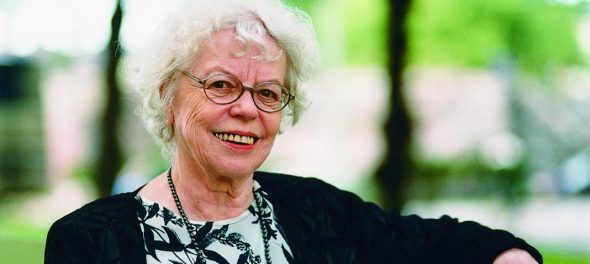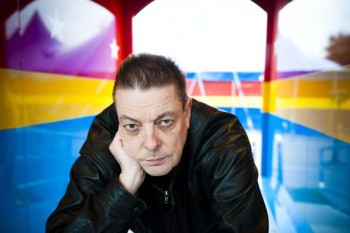Search results for "2011/04/2009/10/2010/05/song-without-words"
Mothers and sons
30 March 2008 | Archives online, Fiction, Prose
Extracts from Helvi Hämäläinen’s novel Raakileet (‘Unripe’, 1950. WSOY, 2007)
In front of the house grew a large old elm and a maple. The crown of the elm had been destroyed in the bombing and there was a large split in the trunk, revealing the grey, rotting wood. But every spring strong, verdant foliage sprouted from the thick trunk and branches; the tree lived its own powerful life. Its roots penetrated under the cement of the grey pavement and found rich soil; they wound their way under the pavement like strong, dark brown forearms. Cars rumbled over them, people walked, children played. On the cement of the pavement the brightly coloured litter of sweet papers, cigarette stubs and apple cores played; in the gutter or even in the street a pale rubber prophylactic might flourish, thrown from some window or dropped by some careless passer-by.
The sky arched blue over the six-and seven-storey buildings; in the evenings a glimmer could be seen at its edges, the reflection of the lights of the city. A group of large stone buildings, streets filled with vehicles, a small area filled with four hundred thousand people, an area in which they were born, died, owned something, earned their daily bread: the city – it lived, breathed….
Six springs had passed since the war…. Ilmari’s eyes gleamed yellow as a snake’s back, he took a dance step or two and bent over Kauko, pretending to stab him with a knife. More…
Sound and meaning
20 January 2012 | Essays, Non-fiction
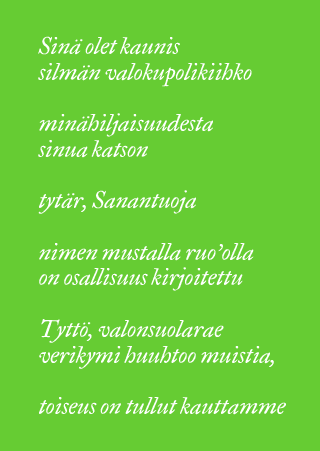
Harri Nordell’s poem from Huuto ja syntyvä puu (‘Scream and tree being born’, 1996)
Translating poetry is natural, claims Tarja Roinila; it is a continuation of writing it, for works of poetry are not finished, self-sufficient products. But is the translator the servant of the meaning – or of the letter?
I am sitting in a cafe in Mexico City, trying to explain in Spanish what valokupolikiihko, ‘light-cupola-ecstasy’, means. And silmän valokupolikiihko, ‘the light-cupola-ecstasy of the eye’.
I take to praising the boundless ability of the Finnish language to form compound words, to weld pieces together without finalising the relationships between them, never mind establishing a hierarchy: the eye is a light-cupola, the eye is ecstatic about light-cupolas, light creates cupolas, the cupola lets out the light, the eye, in its ecstasy, creates a light-cupola. More…
For the love of a city
31 December 2004 | Archives online, Fiction, Prose
Extracts from the novel I väntan på en jordbävning (‘Waiting for an earthquake’, Söderströms, 2004). Introduction by Petter Lindberg
Nonna Rozenberg lived quite near the special school where I was a boarder, in a block nine stories high with a bas-relief to the right of the door. This bas-relief featured a fairy-tale figure – the Firebird or the Bird Sirin.
I often saw Nonna stepping out of a tram carrying a large brown case. She moved carefully, as if afraid of falling.
She played the cello, and resembled that bulky, melodious instrument herself. Women’s figures are often compared to guitars. But Nonna’s appearance never hinted at parties at home with parents away or singsongs around the camp-fire.
She was no beauty. Her slow, precociously mature body was neither graceful nor girlishly delicate. If I’d met her later, when I was working at a gym, I’d have said she was overweight and lacking in self-discipline. More…
In the detail?
11 December 2009 | Essays, Non-fiction
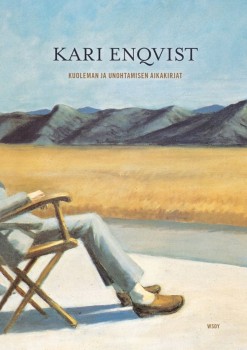 Extracts from Kuoleman ja unohtamisen aikakirjat (‘Chronicles of death and oblivion’, WSOY, 2009)
Extracts from Kuoleman ja unohtamisen aikakirjat (‘Chronicles of death and oblivion’, WSOY, 2009)
What’s the meaning of life? There are those who seek it in religion, while for others that is the last place to look. The scientist Kari Enqvist ponders why some people, including himself, seem physiologically immune to the lure of faith. Perhaps, he suggests, we should look for significance not in the big picture, but in the marvel of the fleeting moment
As a young boy I must have held religious beliefs. However, I cannot pinpoint exactly when they disappeared. At some point I eventually stopped saying my evening prayers, but I am unable to remember why or when this happened. ‘I was born in a time when the majority of young people had lost faith in God, for the same reason their elders had had it – without knowing why,’ writes the Portuguese poet Fernando Pessoa in The Book of Disquiet. More…
Blocks and locks
30 June 2008 | Archives online, Essays, On writing and not writing
For the writer, not being able to write is just one of the profession’s occupational hazards, says the author Eeva Kilpi. She recalls a particularly debilitating attack of the affliction, and offers suggestions for escaping it
I had no idea I was currently suffering from writer’s block until I was asked to describe the condition.
Now I feel – as I sit at my oId, muscle-powered, Facit typewriter – that a horror of words is the first and normal reaction every time I have to begin a piece (let alone a book). Words dart into hiding like a frightened flock of birds that has barely settled to rest. (And now I hear successful, prolific colleagues rushing to explain how easy it is to use a computer to correct mistakes and move entire paragraphs even from one chapter to another, but I am paralysed by the very thought of a flickering screen, ready and waiting, and of the fateful key by pressing which one may destroy an entire immortal manuscript, as I have heard has happened to some people.) More…
New from the archives
13 March 2015 | This 'n' that
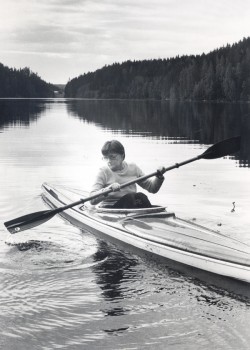
Eeva-Liisa Manner. Photo: Tammi.
Today we have a real treat – a selection of the sumptuously minimalist poetry of Eeva-Liisa Manner (1921–1995) by her near-contemporary, the British poet Herbert Lomas (1924–2011).
Born in Helsinki, Manner spent her youth in Viipuri, in what was then part of Finland; her life was, like Eeva Kilpi’s, marked by evacuation from her home and the subsequent loss of Karelia to the Soviet Union in the Second World War. Her breakthrough collection, Tämä matka (‘This journey’, 1956) marked a major arrival on the modernist poetry scene and her work has been widely translated. Always lyrically minimalist, Manner’s poetry sometimes seemed to approach the limits of language – silence:
The words come and go.
I need words less and less.
Tomorrow maybe
I’ll not need a single one,
she wrote in Niin vaihtuvat vuoden ajat (‘So change the seasons’), as early as 1964.
Lomas brought to the delicate, beautiful textures of Manner’s poetry with its themes of grief, suffering and loneliness a bluff Yorkshire, and entirely masculine, sensibility. For him, Manner had a ‘splendid sanity’ and sense of humour; hers was an oeuvre ‘that heals by listening and recovery’.
Manner’s work has more recently been translated by another English writer, Fleur Jeremiah, in a volume entitled Bright, dusky, bright (Waterloo Press, 2009). A sample of the approach taken by a woman of a different generation can be found here.
*
The digitisation of Books from Finland continues apace, with a total of 360 articles and book extracts made available online so far. Each week, we bring a newly digitised text to your attention.
Relative values
31 March 2004 | Archives online, Fiction, Prose
Extracts from the autobiographical novel Nurinkurin (‘Upside down, inside out’, WSOY, 2003). Interview by Anna-Leena Nissilä
The soldier rides on a scarf
waving a donkey
‘Now it’s your turn to go on,’ says my brother on the back seat, turning his head toward the window so that he can concentrate on his poetic muse.
Father looks in the mirror, wrinkling his face in pain. ‘The object, in other words, is of no significance to you. What happened to your case endings and your grammar?’
From the back seat we shout eagerly: ‘The poet has special privileges which are not accorded to others.’
Father shakes his head: ‘You can be creative, but silly content and broken language do not make poetry.’
‘Oh yes they do. Don’t disturb our creative spirit. When you speak, our connection with her is broken. Don’t cut off the source of our inspiration.’ More…
The unmaking of Finland’s forests
17 March 2010 | Reviews
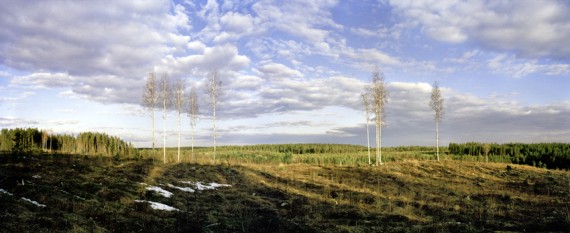
Natural landscapes? According to Metsähallitus, the government body charged with forestry, ‘the regeneration area is defined according to topography, in accordance with the landscape. Retention trees and groups of trees are always left standing in regeneration areas to enhance the landscape and to improve the survival chances of species that require old and decaying trees.’
Ritva Kovalainen & Sanni Seppo
Metsänhoidollisia toimenpiteitä
[Silvicultural operations]
Helsinki: Hiilinielu tuotanto ja Miellotar, 2009. 200 p., ill.
ISBN 978-952-99113-4-9
€ 43
Finns have a strong identity as forest people, partly because more than 95 per cent of them still speak an ancient hunter-gatherer language, Finnish, as their mother tongue. In spite of this cultural and historical background, Finland has become the world’s most eager and influential proponent of forestry models based on clear-cutting – felling all the trees in a particular area at one go and planting new trees to replace them. More…
The Othello of Sand Alley
31 March 1989 | Archives online, Drama, Fiction
Eeva-Liisa Manner’s Woyzeck is an independent ending to Georg Büchner’s fragmentary play. Introduction by Riitta Pohjola
PROLOGUE
(Dawn in the market square of Leipzig. A gallows looms, dimly visible in the distance. Brisk rumble of drums.)
1st WOMAN
What’s going on here?
1st MAN
They’re getting ready for an execution. Some villain’s going to be executed in public.
1st WOMAN
Who?
2nd WOMAN
Franz Woyzeck. I guess you know him, the barber. More…
The return of Orpheus
31 December 1992 | Archives online, Fiction, poetry
from Hid (‘Coming here’, Söderströms, 1992). A Valley in the Midst of Violence, a selection of poems by Gösta Ågren translated by David McDuff, was published by Bloodaxe Books of Newcastle-upon-Tyne in 1992. Introduction by David McDuff
No poet can endure
being dead, a sojourn without
meaning and method. He needs
order and rhythm. His poems
are really laws. He
always turns back
from the underworld, which resembles
the everyday.
The darkness hides the screams
around him, when
the way begins. The sun is
only black heraldry, only
a cavern in the sky
of stone, and he sees
it, without being blinded. More…
We’re all perfect
31 December 1990 | Archives online, Fiction, poetry
Poems from Laki (‘The law’, 1990)
The Law
No one’s stupid – there are
people deprived of the wise,
and those with self-respect
knocked flat. No one’s
hardened – there are people with
calloused wounds.
No one’s blind – there are
people cataracted by custom. Be different:
heal wounds and look up – wake
your dear one in mid-sleep, hug her.
(We’re all perfect.) More…
The funeral
31 December 1988 | Archives online, Fiction, Prose
Hannu Salama’s short story Hautajaiset (‘The funeral’) – taking place in Pispala, Tampere – in the volume Kesäleski, ‘Summer widow’, was published in 1969. Introduction by Pekka Tarkka
On Tuesday Venla came round: as Sulo was being lowered into the grave Vihtori had had a heart attack. The next day a letter arrived from father: funeral on Sunday, and Gunilla and Timo want you to speak at the grave. I telegraphed back: ‘Vikki too close to me. Unable to speak.’ Outside the post office I realised I could have sent fifty words for the same money.
Irma ordered a flower arrangement. Did I want to put an inscription? Part of the last stanza of a revolutionary song went through my head:
Sowing makes the corn come into ear:
Hundredfold higher that happier age will be.
I said not to put anything, I’d say something at the grave if it seemed the thing to do. I told her to put mother’s, father’s and Heikki’s names on, and we’d take these off if they’d sent their own wreath. More…

